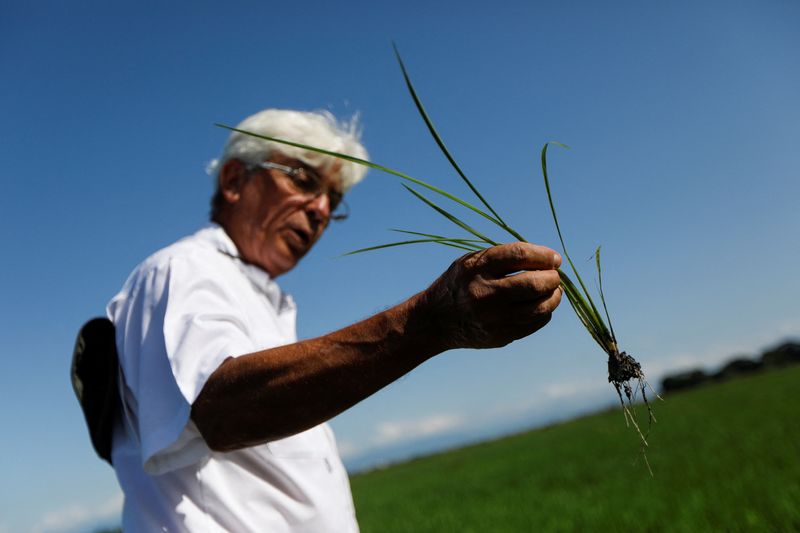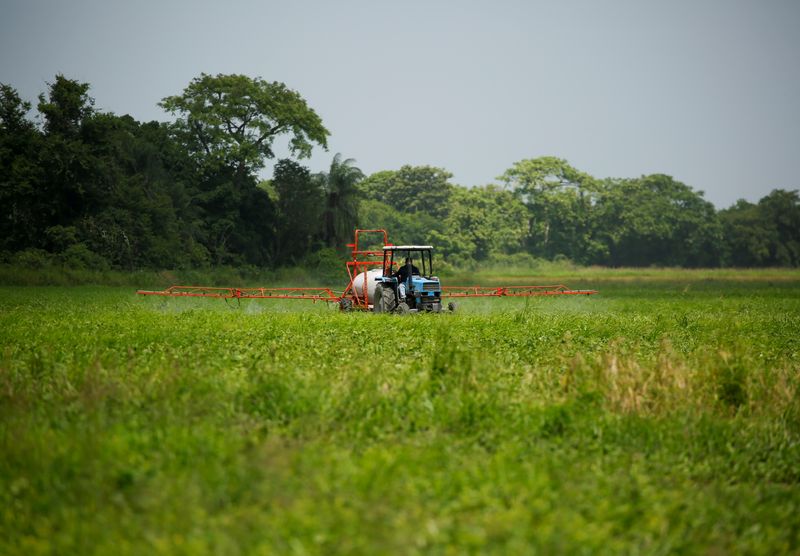By Mayela Armas and Vivian Sequera
TUREN, Venezuela/CARACAS (Reuters) - More than 300 hectares (740 acres) of verdant corn and rice planted by Roberto Latini in the western Venezuelan state of Portuguesa undulate under a bright sun and blue sky.
The growing crops - set to be harvested in September - were able to be planted only because Latini got funding for fertilizers and seeds from an agriculture guild, which has stepped in to front funding for farmers in the economically beleaguered country.
Venezuelan growers of rice and corn - staple crops for domestic consumption - have reversed a years-long slump in production thanks to loans of fertilizers and seeds from buyers, which are freeing up funds to invest in generators and other efforts to fight utility cuts, a dozen farmers said.
The loans - from at least six guilds in Portuguesa and 20 crop-buying groups nationally - come amid tight credit restrictions, which make traditional loans from banks nearly impossible to ink, and inflation of over 50%.
"One survives with the support of the guilds which offer the fertilizers," Latini said as he gave a tour of his farm, adding output could grow more with more funding availability.
The terms of the loans, often paid back with the harvest itself, can still be prohibitive for some small growers.
Without more regular financing from banks, farmers told Reuters challenges will persist and some producers could shut their operations.
Agricultural production in Venezuela, which largely relies on national food output, has plummeted in the last decade after years of price and currency controls, land nationalizations, lack of fuel and failures in public utilities.
President Nicolas Maduro loosened currency restrictions in 2019, allowing transactions in dollars and giving the economy some breathing room. He has also employed an orthodox effort to reduce inflation with credit restrictions and lower spending.
Though "forward selling" of crops is common in other Latin American countries like Brazil, the practice is new and growing in Venezuela, local agricultural experts told Reuters.
Bank loans available to farmers in Venezuela total about $330 million, according to local consulting firm Globalscope. Much of that funding goes to producers of small-scale export crops like sesame and mung beans.
Credit availability is between nine and 12 times that figure in Bolivia and Colombia, according to government figures in those places.
"There is no protection for the (agriculture and ranching) sector in finance," said Gerardo Mendoza, head of local agricultural consultancy Agrotributos.
The communications, agriculture and finance ministries did not respond to requests for comment. Neither did the central bank.
PAYBACK WITH CROPS
Output of rice and white corn was up to 1.2 million metric tons last year, 29% more than in 2022, though that boost is still leagues below production of 3.4 million tons a decade ago, according to agriculture guild figures.
Giorgio Ruffato, also a grower of rice and corn in Portuguesa, represents one association helping fund farmers.
"We give them seeds, insecticides, help with machinery repairs and services to store their harvest," he said at his farm, which includes a small laboratory where he checks for crop damage from pests or fungi.
Producers pay back loans by handing over their harvest or with their earnings from selling to processing plants, who pay them for crops in dollars based on international prices.
But some small producers still do not earn enough to pay back the guilds.
"Many small producers will disappear, some of us are in debt (to associations or companies)," said farmer Cesar Tovar, who sold some machinery to cover his costs.
Higher costs for producers, coupled with 12-month inflation of 51.3%, could trickle down to consumers.
"Any different form of credit is onerous. If you add (public) services and taxes, all that can have an impact on prices," said economist Hermes Perez.
Some farmers are making large investments in roads and back-up power sources because of poor infrastructure and frequent cuts to water and electricity.

"We have had to take up solar panels which charge batteries," said Luis Hernandez, a grower in the state of Apure, who has trouble getting fuel.
Latini uses transformers on his land to keep watering for rice plants working even with power cuts, while Ruffato has repaired some local roads to be able to transport crops.
